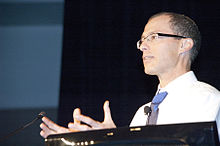
David Haussler is an American bioinformatician known for his work leading the team that assembled the first human genome sequence in the race to complete the Human Genome Project and subsequently for comparative genome analysis that deepens understanding the molecular function and evolution of the genome.

Eugene Wimberly "Gene" Myers, Jr. is an American computer scientist and bioinformatician, who is best known for contributing to the early development of the NCBI's BLAST tool for sequence analysis.
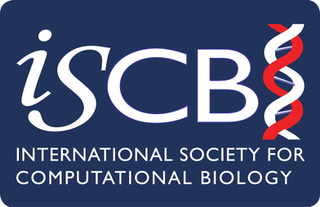
The International Society for Computational Biology (ISCB) is a scholarly society for researchers in computational biology and bioinformatics. The society was founded in 1997 to provide a stable financial home for the Intelligent Systems for Molecular Biology (ISMB) conference and has grown to become a larger society working towards advancing understanding of living systems through computation and for communicating scientific advances worldwide.
Mark Borodovsky is a Regents' Professor at the Join Wallace H. Coulter Department of Biomedical Engineering of Georgia Institute of Technology and Emory University and Director of the Center for Bioinformatics and Computational Genomics at Georgia Tech. He has also been a Chair of the Department of Bioinformatics at the Moscow Institute of Physics and Technology in Moscow, Russia from 2012 to 2022.
The ISCB Overton Prize is a computational biology prize awarded annually for outstanding accomplishment by a scientist in the early to mid stage of his or her career. Laureates have made significant contribution to the field of computational biology either through research, education, service, or a combination of the three.
The ISCB Accomplishment by a Senior Scientist Award is an annual prize awarded by the International Society for Computational Biology for contributions to the field of computational biology.
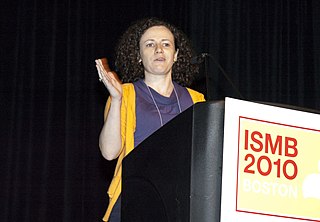
Olga G. Troyanskaya is a Professor in the Department of Computer Science and the Lewis-Sigler Institute for Integrative Genomics at Princeton University and the Deputy Director for Genomics at the Flatiron Institute's Center for Computational Biology in NYC. She studies protein function and interactions in biological pathways by analyzing genomic data using computational tools.
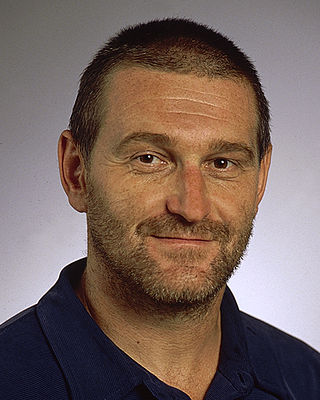
Pavel Arkadevich Pevzner is the Ronald R. Taylor Professor of Computer Science and director of the NIH Center for Computational Mass Spectrometry at University of California, San Diego. He serves on the editorial board of PLoS Computational Biology and he is a member of the Genome Institute of Singapore scientific advisory board.

Aviv Regev is a computational biologist and systems biologist and Executive Vice President and Head of Genentech Research and Early Development in Genentech/Roche. She is a core member at the Broad Institute of MIT and Harvard and professor at the Department of Biology of the Massachusetts Institute of Technology. Regev is a pioneer of single cell genomics and of computational and systems biology of gene regulatory circuits. She founded and leads the Human Cell Atlas project, together with Sarah Teichmann.

Robert F. Murphy is Ray and Stephanie Lane Professor of Computational Biology Emeritus and Director of the M.S. Program in Automated Science at Carnegie Mellon University. Prior to his retirement in May 2021, he was the Ray and Stephanie Lane Professor of Computational Biology as well as Professor of Biological Sciences, Biomedical Engineering, and Machine Learning. He was founding Director of the Center for Bioimage Informatics at Carnegie Mellon and founded the Joint CMU-Pitt Ph.D. Program in Computational Biology. He also founded the Computational Biology Department at Carnegie Mellon University and served as its head from 2009 to 2020.

Tandy Warnow is an American computer scientist and Grainger Distinguished Chair in Engineering at the University of Illinois at Urbana–Champaign. She is known for her work on the reconstruction of evolutionary trees, both in biology and in historical linguistics, and also for multiple sequence alignment methods.

Ron Shamir is an Israeli professor of computer science known for his work in graph theory and in computational biology. He holds the Raymond and Beverly Sackler Chair in Bioinformatics, and is the founder and former head of the Edmond J. Safra Center for Bioinformatics at Tel Aviv University.

Gary Stormo is an American geneticist and currently Joseph Erlanger Professor in the Department of Genetics and the Center for Genome Sciences and Systems Biology at Washington University School of Medicine in St Louis. He is considered one of the pioneers of bioinformatics and genomics. His research combines experimental and computational approaches in order to identify and predict regulatory sequences in DNA and RNA, and their contributions to the regulatory networks that control gene expression.
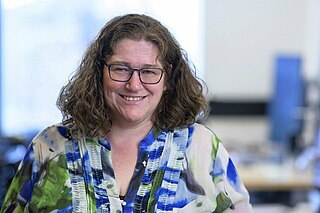
Dana Pe'er, Chair and Professor in Computational and Systems Biology Program at Sloan Kettering Institute is a researcher in computational systems biology. A Howard Hughes Medical Institute (HHMI) Investigator since 2021, she was previously a professor at Columbia Department of Biological Sciences. Pe'er's research focuses on understanding the organization, function and evolution of molecular networks, particularly how genetic variations alter the regulatory network and how these genetic variations can cause cancer.
Mathieu Daniel Blanchette is a computational biologist and Director of the School of Computer Science at McGill University. His research focuses on developing new algorithms for the detection of functional regions in DNA sequences.

Bonnie Anne Berger is an American mathematician and computer scientist, who works as the Simons professor of mathematics and professor of electrical engineering and computer science at the Massachusetts Institute of Technology. She is the head of the Computation and Biology group at MIT's Computer Science and Artificial Intelligence Laboratory. Her research interests are in algorithms, bioinformatics and computational molecular biology.

The Ray and Stephanie Lane Computational Biology Department (CBD) is one of the seven departments within the School of Computer Science at Carnegie Mellon University in Pittsburgh, Pennsylvania, United States. Now situated in the Gates-Hillman Center, CBD was established in 2007 as the Lane Center for Computational Biology by founding department head Robert F. Murphy. The establishment was supported by funding from Raymond J. Lane and Stephanie Lane, CBD officially became a department within the School of Computer Science in 2009. In November 2023, Carnegie Mellon named the department as the Ray and Stephanie Lane Computational Biology Department, in recognition of the Lanes' significant investment in computational biology at CMU.
Daniel Mier Gusfield is an American computer scientist, Distinguished Professor of Computer Science at the University of California, Davis. Gusfield is known for his research in combinatorial optimization and computational biology.

Hanah Margalit is a Professor in the faculty of medicine at the Hebrew University of Jerusalem. Her research combines bioinformatics, computational biology and systems biology, specifically in the fields of gene regulation in bacteria and eukaryotes.
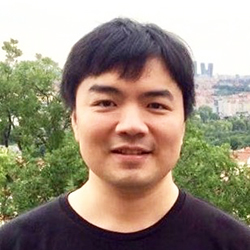
Jian Ma is an American computer scientist and computational biologist. He is the Ray and Stephanie Lane Professor of Computational Biology in the School of Computer Science at Carnegie Mellon University. He is a faculty member in the Ray and Stephanie Lane Computational Biology Department. His lab develops machine learning algorithms to study the structure and function of the human genome and cellular organization and their implications for evolution, health and disease. During his Ph.D. and postdoc training, he developed algorithms to reconstruct the ancestral mammalian genome. His research group has recently pioneered a series of new machine learning methods for 3D epigenomics, comparative genomics, spatial genomics, and single-cell analysis. He received an NSF CAREER award in 2011. In 2020, he was awarded a Guggenheim Fellowship in Computer Science. He is an elected Fellow of the American Association for the Advancement of Science. He leads an NIH 4D Nucleome Center to develop machine learning algorithms to better understand the cell nucleus. He is the Program Chair for RECOMB 2024.
